|
Late Winter
1989 and the Coming Spring
The New York
Times often visited the Blackhorse Regiment to measure the
morale and check on the mission of the 7th Army in Germany.
The article below, from early 1989 reports a re-armed force
ready to do its job despite the privations of being so far
from ho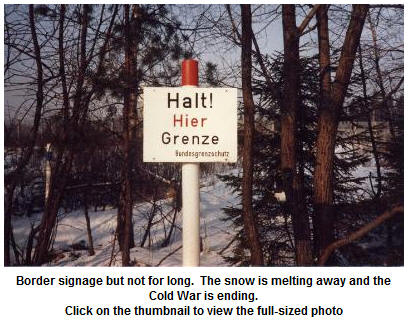 me in expensive Germany. In many ways, that day in
1989 echoed the past; despite more and better equipment,
improved training and morale, troopers were still patrolling
along roads and trails adjacent to East German barbed wire
just as they had in 1950. But there is also that subtle
feeling of possible change to the status quo. me in expensive Germany. In many ways, that day in
1989 echoed the past; despite more and better equipment,
improved training and morale, troopers were still patrolling
along roads and trails adjacent to East German barbed wire
just as they had in 1950. But there is also that subtle
feeling of possible change to the status quo.
With
Gorbachev leading the Soviet Union, a new style leader was
at the helm and for millions of Europeans and the troopers
at Point Alpha, the 1st Squadron Border Observation Camp,
maybe there was room for change.
Who could
have imagined that nine months after this article, indeed
everything on the border and soon after, with the Blackhorse
would be so dramatically different.
On the
Central Front in Germany, Quiet Life and Good Duty for GIs
SERGE
SCHMEMANN
Special to
the New York Times
February 27,
1989
FULDA, West
GermanyŚ Had the Russians invaded the West that day, the
American Army sergeant perched with elaborate binoculars on
the watchtower of Observation Post Alpha could have been the
first to spot them.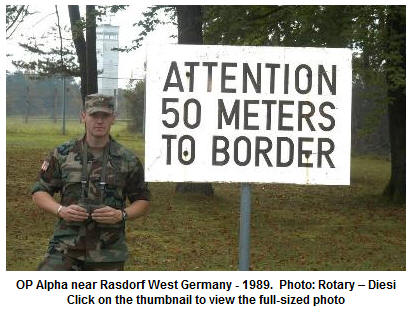
For a few
hours, his assignment was to stand watch at the Fulda Gap,
where the East juts farthest into the West and so, in
theory, the corridor through which invading Soviet tanks
would slice into Western Europe.
But the
central front was quiet that frosty day, as it has been for
the 44 years since Gen. George Patton drove Hitler's armies
back through here.
''I've never
seen any Russians,'' conceded the young sergeant, David
Rinehart.
Unlike the
Americans, who patrol right up to the line, Soviet troops of
the crack Eighth Guards Armor stay out of sight, leaving
day-to-day patrolling of their side of the divide to the
East Germans, who peer at Alpha from a watchtower 300 yards
away. Frontier and Symbol
In any case,
the Russians have no evident intention of attacking these
days, and even if they did, American satellites would spot
the movement long before the first tank would come within
sight of Alpha.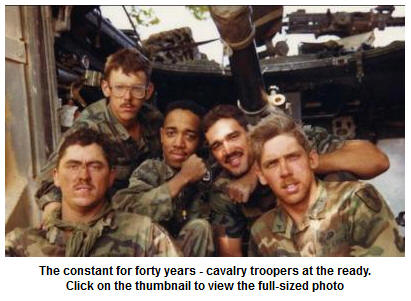
But even if
the strategic significance of Alpha is moot, it was clear
that the border post played a central symbolic role for the
11th Armored Cavalry Regiment, which is responsible for this
228-mile stretch of the border, as for some 350,000 American
service personnel in Europe.
''We call it
the frontier of freedom,'' said Capt. Bart D. Nolde at the
start of a drama-packed briefing at 11th Armored Cav
headquarters in the picturesque city of Fulda, about 10
miles west of Alpha.
Soldiers
moved about in full field gear, officers wore side arms, and
when a helicopter arrived with a visitor, troops lay prone
with M-16's at the ready around the landing field to
''secure the landing zone.''
Yet as a
symbol of the North Atlantic Treaty Organization's
traditional doctrine when the strategies and presumptions of
the alliance are being buffeted by shifts in global politics
and public perceptions, by new winds in Moscow, by a
quickening momentum in disarmament and by the exigencies of
shrinking budgets, Alpha may also be a threatened outpost.
New
negotiations on reducing conventional forces are scheduled
to open between NATO and the Warsaw Pact in Vienna on March
6. In Washington, the Bush Administration has already
announced the closing of several domestic military bases as
a prelude to cuts in defense spending.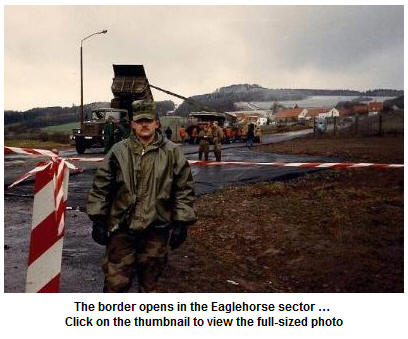
In West
Germany, the public is showing ever greater irritation at
the concentration of foreign troops on German soil and at
the sense that the land is still under the vestiges of
military occupation.
And from
Moscow, the peace overtures of Mikhail S. Gorbachev, the
Soviet leader, have divided the Western allies between those
- predominantly in Washington and London -who would wait and
see how the economic changes in the Soviet Union fare before
making any modifications in Western defenses, and those -
most notably in West Germany - who believe the West should
actively encourage Mr. Gorbachev.
Is Gorbachev
Serious? Seeing Is Believing
Such notions
are not widely shared among the soldiers who stare daily
across the broad no-man's land - once the border of the
Kingdoms of Prussia and Saxony - with its three parallel
fences stretching the length of the inter-German border,
obviously designed more to keep East Germans in than the
Americans out.
A landmark at
Alpha is a white birch cross at the foot of the watchtower,
where an East German farmer was fatally shot one Christmas
while trying to escape with his son.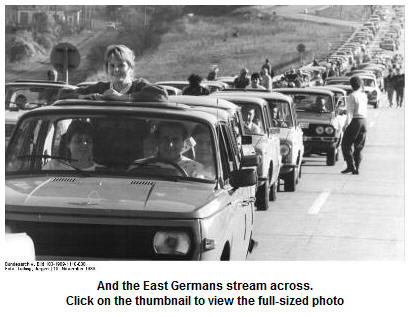
''When we
start seeing fewer coming over, I'll believe Gorbachev is
doing something serious,'' Captain Nolde said.
From a purely
military standpoint, trying to stop Soviet invaders at the
border would be foolhardy, since the attacking forces would
have the advantage of surprise and mobility.
But then the
American military's function in Europe has long been a
shifting blend of firepower, politics and bluff.
A Show of
Resolve And a Display of Force
About a
quarter of West Germany's population lives within 30 miles
of the border, and the mission of the 11th Armored Cav - the
elite ''Blackhorse,'' with 4,400 soldiers, state-of-the-art
Abrams M-1 tanks, Bradley armored combat vehicles and attack
helicopters - is to show both the Russians and the West
Germans the determination of the North Atlantic allies to
protect every inch of the West.
That forward
defense doctrine has been fundamental to NATO since the
alliance was forged 40 years ago, and it is one reason that
the United States and its allies have contributed to putting
on the central front the heaviest concentration of military
firepower ever massed in peacetime.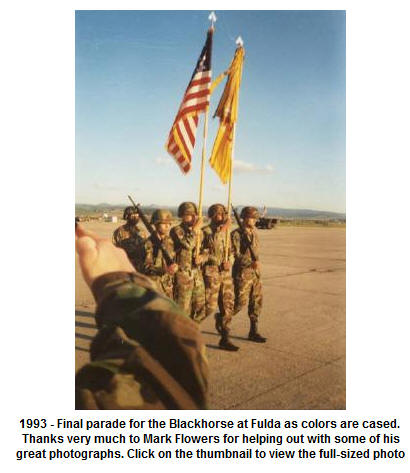
While debates
on military doctrine, the ''Gorby factor'' and the new
German assertiveness swirl through Washington, Bonn and
Brussels, for the soldiers secure in a transplanted America
of PX's, fast-food places, movie houses and Armed Forces
Network television, only the vagaries of exchange rates mar
a closed world that otherwise has never been so good.
Hitler's
Strongholds Now Have New Tenants
Theirs is a
unique archipelago of 800-odd posts scattered through
central and southern West Germany, ranging from tiny depots
in the back hills of the Rhineland to large headquarters
complexes in Frankfurt and Heidelberg and sprawling air
bases like those at Ramstein or Hahn. Most were bases taken
over by the United States Army from Hitler's defeated
Wehrmacht at the end of World War II.
In the 43
years since, these islands have coalesced into an outpost of
Americana. Ringed by cordons of pizzerias, used-car lots,
bars and video-rental shops, the bases and the families that
people them - typically Americans from small towns - have
become a familiar and commonplace fixture of modern German
life.
''When we
were young, the 'Amis' were the ones with real money, who
could afford the fuel for big cars,'' recalled Ludwina Otto,
a German woman in her late 20's who grew up near the Hahn
Air Base and eventually married an American airman. ''We
thought they were loud and wore baseball caps and checkered
pants and sneakers, and their kids had no discipline and
they never spoke German.''
The
stereotypes still hold, with the notable exception that the
Americans are no longer the ones with money. And the main
effect of the rise of the German mark has been to make the
217,000 G.I.'s more dependent on their own archipelago and
isolated even more from the ''host country.''
G.I.'s Are
Accepted If Not Quite Loved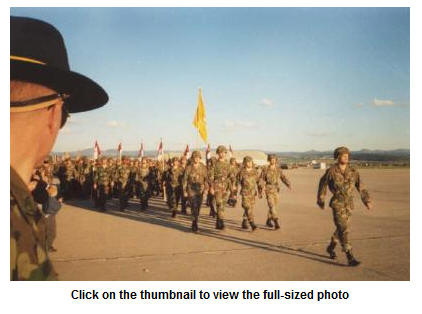
In general,
there is no evidence that the irritation increasingly voiced
by West Germans over the concentration of men and arms on
their soil, or more broadly the sense that they are still
somehow occupied, has translated into overt
anti-Americanism. Even as German irritation over low-flying
jets or the damage from tanks on exercise has grown
considerably more vocal, the sentiments rarely extend to the
G.I.'s.
Some taverns
near American posts display ''Members Only'' signs to keep
out G.I.'s, but for the most part the soldiers are welcome
at the bars and many village festivals, and many single
G.I.'s still find German spouses. Even those Germans who may
be fiercely opposed to new American missiles or screeching
training flights pay little heed to the American corporal in
camouflage fatigues pushing his luggage through Frankfurt
Airport, or the Plymouth with ''U.S.A.'' license plates
cruising the Autobahn.
''You have to
distinguish between military exercises, which nobody wants,
and the Amis, who are part of the local scene,'' said Karsten Voigt, a spokesman on military affairs for the
Social Democratic Party in Parliament.
''I live near
an American base in Frankfurt - you see them all the time,
in the streets, in the subways, they're about 5 percent of
the population, but they're part of a different world. They
live in their own isolated villages, and normally they keep
to themselves.''
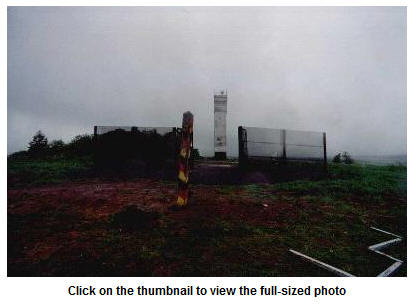
Germans of 2
Minds On the U.S. Presence
The German
attitude seems to reflect an ambivalence that comes through
in public-opinion polls that show both a pronounced
enthusiasm for Mr. Gorbachev and a matching desire to remain
in NATO.
''What we're
seeing here is a wish to have their cake and eat it too
among the Germans, a desire to enjoy their prosperity and
security without the hassle of low-level flights and ripped
up cornfields,'' an American diplomat said. ''But it's hard
not to sympathize. This is a country the size of Oregon, and
all these troops are roaring around.''
The ''Amis''
may not seem as rich to the Germans as they once did. But
within their own world, it has been a long time since they
were so well off.
By common
consent, the eight years of the Reagan era have been a
windfall for the military, with the introduction of some 400
new weapons systems.
In the new
tank shed at Alpha, crews tinker with six Abrams M-1 tanks,
the cutting edge in armor. Back at the headquarters of the
11th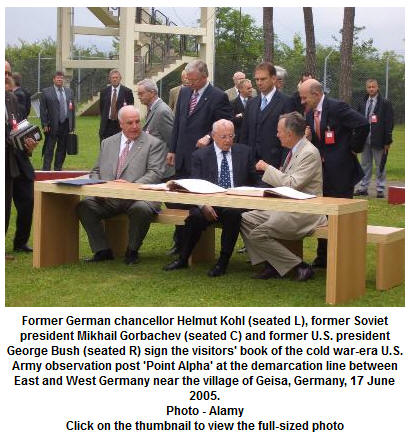 Armored Cav in Fulda, new Bradley armored fighting
vehicles stand alongside broad new ''Hummer'' (Highly Mobile
Multipurpose Wheel Vehicle) jeeps. Armored Cav in Fulda, new Bradley armored fighting
vehicles stand alongside broad new ''Hummer'' (Highly Mobile
Multipurpose Wheel Vehicle) jeeps.
The new sheen
is not restricted to the hardware. Old barracks glow with
new paint and insulated windows. The bunks are thick and
comfortable, the mess hall has a salad bar and a burger
counter, the roads and parking lots are smoothly paved.
To be sure,
as the unit designated to absorb the first blow of the
Russians, the 11th Armored Cav has always had it better than
the soldiers on the hundreds of posts, large and small,
tucked away in the hills and forests of Bavaria and the
Rhineland.
There is a
conscious elitism - a military salute is accompanied by a
shout of ''Blackhorse,'' the unit's proud symbol. The
commanding officer, Col. John N. Abrams, is the son of Gen.
Creighton Abrams, the late commander of United States forces
in Vietnam, for whom the new M-1 tanks are named.
But even the
smallest depot the Hunsruck woods south of Frankfurt has
benefited from the Reagan spree.
Army on the
Mend: Soldiers Find Stability
''Before
Reagan, morale was incredibly low, drugs were common,
equipment was rotting away, soldiers lived six to a room in
rooms built for four,'' recalled John Kominicki, who served
in the Army in Europe before becoming city editor of Stars
and Stripes, the newspaper for G.I.'s in West Germany.
Now at V
Corps headquarters in Heidelberg, officers cite rows of
statistics to demonstrate the recovery of the Army from the
wounds of Vietnam and neglect - 94 percent of soldiers have
high school degrees, drug abuse is way down, re-enlistment
is high, spending on services is sharply up.
Despite the
fallen dollar, the Americans have remained a major source of
income for Germans living near an American base. Many
Germans work on the bases or at businesses keyed to the
Americans. More than half the soldiers are married, and many
bases, unable to keep up with the demand for family
quarters, are sending many more soldiers and airmen out to
live ''on the economy.'' German landlords, keenly aware of
military housing allowances, charge the ''Amis''
considerably more than they charge Germans.
April 2016 |